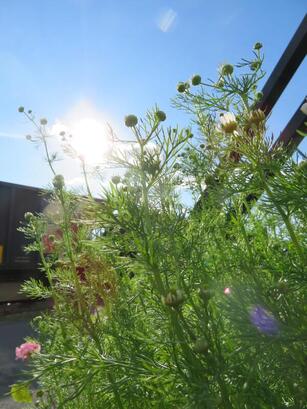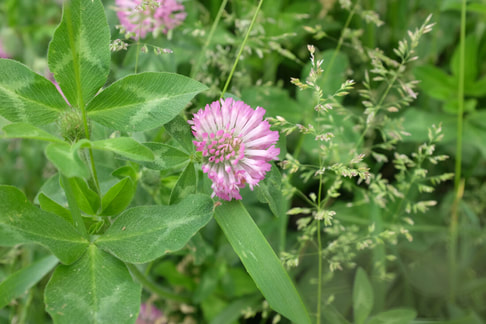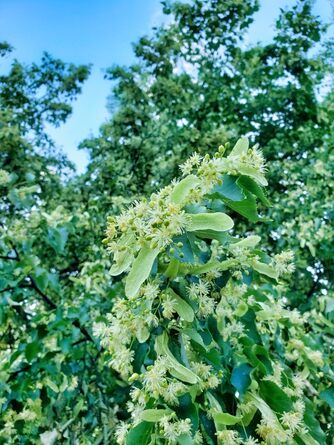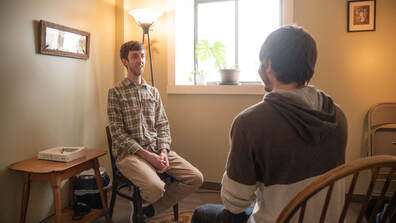|
1/27/2023 7 Pillars of Healthy Sleep: How Diet, Lifestyle and Herbs Can Improve Your Sleep PatternsRead Now Chamomile in the rail yard. Chamomile in the rail yard. In modern time, many people have difficulty with sleep. In this guide we'll walk you through some of the most important factors for promoting healthy sleep, including herbs that can play a supportive role. Please keep in mind that though what we'll discuss here are foundational things for healthy sleep, for some people they may not be enough. Please consider seeking medical help if needed. And if you are looking for support in working with herbs, we'd suggest talking to an herbalist. 1. Have a consistent sleep and wake schedule Experts agree that in terms of healthy sleep there are many benefits from keeping a consistent sleep time and wake time, even on the weekends. This can help to regulate our circadian rhythms and natural hormonal shifts that take place relative to sleep and wakefulness. In the modern day this is not easy! It's common to stay up late and sleep in on the days off from work. For those looking to improve their sleep though, it may benefit to start moving toward a more consistent direction, even if it's a small change (for example 30 minutes closer to the same time). 2. Have healthy daytime habits Exposure to daylight and daytime exercise are two things that can have an impact on sleep. Exercising consistently in the morning hours can help stimulate seratonin. Seratonin contributes to feelings of wakefulness and alertness, and it is better for sleep if it's stimulated earlier in the day. If it's not possible to exercise in the morning, then consider getting at least a chance to spend time outside in the daytime hours. Additionally, a lot of people are not able to sleep restfully due to the effects of stress. How are you managing your stress during the day? Are there additional tools you could be utilizing? People you could call on for support? If sleep is an issue, consider looking further into ways to support yourself during the daytime hours so that you feel more relaxed and ready to sleep at night. 3. Consider the effects of food on sleep Consider eating a breakfast and lunch at consistent times during the day. Including protein in your breakfast meal will help to increase feelings of wakefulness because protein can promote the synthesis of dopamine. Also, protein takes longer to break down than carbs and can provider longer lasting energy. At nighttime, it's best to avoid eating 2-3 hours before bedtime. If you do feel the need to eat closer to bed, choose higher-carbohydrate foods which can digest more quickly and easily, and which naturally may promote feelings of sleepiness. 4. Be aware of stimuli The obvious stimuli are substances like caffeine and tobacco (but alcohol too can interfere with good quality sleep even though it may initially promote drowsiness). Consider limiting or avoiding these substances, especially in the evening, if you are having difficulty with sleep. Light is another major stimulus when it comes to feelings of wakefulness. The big one is screens, which due to their blue light may interfere with melatonin (a sleep promoting hormone). Ideally, limit exposure to screens for at least 1 hour before bed. If you like to read on a screen, consider reading printed material in low light instead. Additionally, consider reducing other indoor, artificial light sources as the sun goes down in order to promote natural circadian rhythms. 5. Utilize relaxation techniques In addition to the many tools and support mechanisms for managing stress during the daytime hours, there are some specific techniques for promoting relaxation and rest at night: - Take a hot bath or shower 1-hour before bed - Do meditation or yoga to unwind - Journal with pen and paper to process emotions - Write down lists of things you need to do, and maybe even put them on a calendar - Chat with a loved one or friend - Drink a cup of herbal tea If you're not sure where to start, consider picking just one thing and giving it a try for some time. 6. Optimize your sleep environment If you have the means available, consider optimizing your sleep environment starting with your bed itself. How comfortable is the mattress itself? Could it be more comfortable by replacing it or adding a mattress pad? Also consider the bedding and sleep clothing you're utilizing to optimize comfort. Also consider eliminating light sources in your bedroom by using heavy or blackout curtains, and by reducing or eliminating electronic sources of light. Why do you need to see the digital clock? If you are setting an alarm anyway, it probably doesn't actually help to know what time it is if you wake up during the night. One sleep expert suggests that if you can see your hands in front of your face with the lights out in your bedroom that's too much light - keep on trying to reduce it even more. For people sharing their bedroom space with others, there may also be issues to address when it comes to the way that others are affecting their sleep. Though it is doubt not easy, keep in mind that that snoring, etc. of others may ultimately may need addressing too. And also if possible consider optimizing the bedroom itself for relaxation and comfort. The bed should really be for only two things: sleep and sex. How can you change what's in the bedroom so that you're not doing other things there like watching TV, working, etc.? 7. Utilize herbal remedies that promote sleep As you can tell from this whole blog post, herbs are just one part of the equation and they are not a magic fix all on their own. But they can play a big part in promoting healthy sleep! First of all, please keep in mind three things when it comes to herbs and sleep: 1) The proper dose is needed to have effects. If you are less sensitive to herbs, you may need more than expected, for example two tea bags instead of one 2) There are many reasons that cause people to do better with some herbs for sleep than others, including individual constitution, underlying health conditions, individual differences in metabolism and more. If you don't find effects from one herb, don't give up! And rather than simply trying things on your own, we'd strongly recommend doing an herbal consultation to get guidance in finding the herbs that are most likely to work for you. 3) While herbs can play a big role in healthy sleep for so many people, in some cases, herbs just may not work. This may include people with long-term, chronic and/or severe insomnia, people with underlying health conditions or people using certain medications. If you think you may be one of those people, we would suggest seeking medical advice to support sleep. There are two main issues with sleep: falling asleep or staying asleep. Here are some gentle herbs that may assist with falling asleep: - Chamomile - Lavender - Passionflower - Skullcap - Valerian Oftentimes people like to take them as an herbal tincture 30-60 min. before bed. Some people like them as an herbal tea, however be aware of how fluid consumption may create a need to wake and urinate. No matter the form consider consuming the herb in a mindful way: noticed the smell, the taste, the feel in your mouth and in your body. Allow your body, mind and spirit to relax and be open to the ways that this plant may provide a sense of comfort and support. Doing so amplify the effects you feel from working with this plant. Another strategy is to take the first dose of herbs 1 hour before sleep, and another dose right before bed. This can sort of prime the body to begin winding down, and then give an extra relaxation boost when it's time to fall asleep. If the problem is not falling asleep but staying asleep that can be more difficult. Some people like to have a tincture by their bedside for if the wake during the night. Two herbs that might help with staying asleep when taken before bed are: - California poppy - Ashwagandha Conclusion In modern times, for many reasons, sleep issues are common. There is a lot we can do in the realm of diet and lifestyle to improve sleep. There are also herbs that can play a role. We'd suggest speaking with a clinical herbalist for guidance. And if your sleep issues are severe, or due to an underlying medical condition, we'd suggest speaking to a medical doctor. We are here to help - please let us know if you have any questions! References Winter, W. C. (2018). The Sleep Solution: Why Your Sleep is Broken and How to Fix It. United States: Penguin Publishing Group. Get sleep support from an herbalist
🌿 Schedule a "quick advice" herbal consultation for a 20-minute chat We'll come up with a custom herbal sleep formula for your individual needs. 🌿 Looking for deeper support? Schedule our 3-month herbal support package. We'll help you to find the root cause of sleep difficulties with a comprehensive review of your overall health and a personalized herbal, diet and lifestyle plan.
1 Comment
 What is holistic medicine? The term holistic medicine can refer to a style of practice of conventional medicine. More often, it refers to alternative healthcare modalities including herbal medicine. Here are the some of the major differences from typical conventional medicine: Body, mind and spirit are addressed as an integrated whole The practice of conventional medicine is based on a mechanistic view of the body that was developed in the 1600's in Europe. Philosophers such as Descartes developed a worldview that separated mind and body (which was done, perhaps ironicaly, for religious reasons). The mechanistic view sees the body as a collection of individual material parts, and treatment aims at making changes in those individual parts. This paved the way for the great medical achievements we can all be grateful for. By contrast, the holistic view of the body sees the person as an integrated whole. In broad terms, we say that holistic medicine address body, mind and spirit. This doesn't mean rejecting the mechanistic view, but adding an additional lens through which to understand health. This means that when someone has a imbalance, a holistic approach would be to look at the broad, overall factors: - How does lifestyle play a part? - How do stress and emotional health contribute? - How are the parts working together as a whole, on a subtle, perhaps immaterial level? Find the root cause of imbalance While a good conventional medical doctor definitely will seek to identify causes of illness and address them, holistic medicine generally prioritizes this much more. Holistic modalities such as herbal medicine do also have the ability to address symptoms, just as conventional medicine does. But the power in holistic medicine is the ability to go beyond that and to seek resolution or at least longer-lasting relief by address the causes of imbalance. Often times people experience multiple symptoms that may have similar root causes. For example, someone may experience digestive issues, skin flare-ups and sleep issues - these can all be addressed symptomatically with conventional and holistic medicine. However they may all relate back to a common root cause, such as stress, digestive insufficiency, food intolerance, or a sedentary lifestyle. A holistic provider can help to identify the root cause and provide support in addressing it. Gentle remedies that support the body's own ability for self-healing Holistic medicine generally supports the use of gentle, non-invasive interventions. While gentle interventions are safer and less likely to cause adverse effects it doesn't meant that they are less effective. Holistic providers often believe that the body has its own capability for self-healing. By working with this capability rather than seeking to provide a substitute for it, profound changes can result. Take for example someone who is experiencing occasional heartburn. One approach would be to reduce acid in the stomach with medication. This is certainly a helpful thing to do in some cases because it can prevent the harm that chronic reflux can cause. But a more holistic approach would be support the body's ability to heal the muscosa and prevent the need for medication. Gentle remedies used in this process often take time to have their full effects, but the effects may be more lasting. Personalized care Holistic medicine is generally much more individual and personal that conventional medicine (though conventional medicine may be becoming more personalized). Personalized approaches can often lead to better results with less adverse effects. For example, in herbal medicine we often use the lens of individual constitution. There is a long history in medicine traditions around the world in recognizing different constitutional types: there are "fire-y" people, "air-y" people or "earthy" people, for example. Herbalists provide remedies that not only are specific for the symptoms someone is experiencing, but which also match their unique constitutional type. The personalized approach is one of the reasons why using gentler interventions can still provider profound results. With the art of personal assessment, holistic providers can help people to more naturally shift back into a state of balance based on their own patterns. Different types of holistic medicine modalities There are many different types of holistic medicine. Herbal medicine This is a part of all cultural traditions throughout the world. While still utilized by an estimated 80% of the world's population, just a few generations back it would have been close to 100%. Herbal medicine thrives as a modality that is natural, safe, and convenient in that it can be utilized right at home. Acupuncture Acpuncture is one part of Traditional Chinese Medicine. It involves the use of needles placed at various "meridian points" throughout the body. The theory behind acpuncture is that it allows the practitioner to manipulate subtle energy channels or "qi" in the body to promote healing. Naturopathy Naturopathic medicine has been practiced in the U.S. since around 1900. It is a modality that incorporates conventional medicine but which adds in holistic therapies such as herbs, homeopathy and manual therapy. Naturopathic doctors are licensed to practice medicine in several U.S. states, including Vermont, meaning that insurance can sometimes cover naturopathic care. Ayurveda Ayurveda is the traditional healing system of India. It's based largely on the understanding of how three different "doshas" operate in the body: vata, pitta and kapha. Ayurvedic practitioners may use a variety of methods to address health, including the use of herbs and minerals, massage, diet, detoxification therapies and more. This is just a short list of examples, there are many more! How to incorporate holistic medicine into your life As herbalists, we are in full support of conventional medical care, and suggest that everyone have a doctor who can provide them that care when needed. We see holistic medicine is something that you can incorporate into your life as a complement to your conventional care. Self-study in holistic medicine is an option for certain things, like handling minor, everday ailments, and for preventing illness. However where there are more difficult health challenges, we suggest working with a holistic medical provider to help guide you on your path to wellness. As herbalists, we are happy to help support you on your healing journey. Check out the information below to learn more. Get holistic support from an herbalist 🌿 Schedule a "quick advice" herbal consultation for a 20-minute chat We'll pair you with an herb or herbal blend that matches your personal constitution and individual mental/emotional needs. 🌿 Looking for deeper support with mental/emotional health? Schedule our 3-month herbal support package. We'll help you address the root causes of imbalance with herbal support plus diet + lifestyle support.  Many of us are facing some form of health challenge. It may be the effects of stress on sleep, digestion or mood. It may be a low-grade, chronic health condition. It may be a new issue that was unexpected. Enter plants. Herbs are effective You probably already know from your own experience that plants work. Maybe you have felt the energizing effects of echinacea when sick, the soothing effects of licorice on a sore throat, or the calming effects of a nice cup of chamomile tea. What not everyone is aware of is that plants can also help with the more challenging health issues that can come up. Our traditions shows us this When looking at the world as a whole, we can see that many people rely on herbs. Estimates are that around 80% of the world's population relies on herbal medicine for some part of their primary healthcare. In the U.S., there are people who grew up relying on herbs in their home. For those that didn't, it only takes looking a few generations back to see that the history was there. Our ancestors didn't know everything, and didn't have all the modern tools we have, but they were practical - they found what worked, and they passed the knowledge along. Research is showing it more and more Here are just a few recent meta-analyses (the gold-standard in research):  Herbs often work best with guidance There are generally two paths to utilizing herb for your personal health. One is self-study, or the support of family members or friends. The other is the support of a clinical herbalist or other skilled practitioner. For common, mild concerns such as immune support or relaxation, self-study is more than sufficient. It's easy to to read a book or talk to a friend about an herb to help soothe and relief common discomforts that we all experience from time to time. For the more chronic or serious concerns, this is where working with a clinical herbalist (or equivalent) is much more effective. Clinical herbalists are highly trained and understand the nuances of the individual experience of different health imbalances. Getting guidance is a safer way to go Herbs are generally safer and gentler than pharmaceutical medications, which is one of the main reasons to use herbs. However, there are some safety considerations to be aware of. Herb-drug interactions are rare but can post a significant risk for some people. Clinical herbalists are trained in herb safety and are able to help you navigate the risks in conjunction with your medical provider. Adverse effects from herbs are also rare but are possible. Just because it's natural doesn't inherently mean it's safe. The very young, very old, and people with serious medical conditions are most at risk for experiencing adverse effects. Clinical herbalists can help you create a plan that is safe for you as an individual. Getting guidance saves time and money Experimenting on your own can be costly. You may try many things that don't work. Working with an herbalist helps you get to an effective solution quicker. Clinical herbalists can also help you to find a solution that fits within your budget. There are many options for taking herbs, including tea, tincture, powder and capsule. Clinical herbalists can help you learn to incorporate less costly solutions into your daily life, and can even help you learn how to grow, harvest or prepare your own herbs and herbal remedies. Personalized solutions work better We've all heard about so many popular herbs: turmeric, echinacea, garlic, etc. The thing is, those popular herbs usually do work for many people - but they often don't work for a lot of other people. The reason for a diversity of effects has to do with what herbalists call individual constitution. We're all built in different ways, and we've all been shaped by different life experiences. The real magic of herbal medicine comes with matching the herb and the person. A clinical herbalist can do a traditional assessment to help you identify the specific herbs that best match the current pattern of your health. Additionally, clinical herbalists can blend individual herbs together to create a final product that meets your individual needs. This is often more effective than using any one popular herb on its own. The other options may not be enough Perhaps you've tried conventional medicine. Herbalists generally are not adverse to conventional medicine at all. The profound power of modern interventions is something we can all be grateful for. Yet many people have not fully found the answers that they are looking for with conventional medicine alone. Herbal medicine truly shines as a supportive form of care, either for conditions that are not overt enough for medical treatment (i.e. "sub-clinical"), or as a complementary support for medical treatment. Give an herbal consultation a try Clinical herbalists are highly trained. We learn basic anatomy, physiology, pathology and pharmacology. We learn about holistic, natural and simple ways to support health through diet and lifestyle. And we learn the plants better than probably anyone else -through deep study and time hands-on with the plants we get to know them through personal experience. If you're ready for a change, a natural solution, and to have someone there to support you on your health journey - consider giving an herbal consultation a try. At Railyard Apothecary the process is simple:
 The meaning of winter Beyond our human customs, there is a natural way of this season. The winter solstice marked the ending of the waning of daylight, and the beginning of the the slow return of sunshine. At the same time, the depths of winter are just beginning, and the coldest, snowiest days of the year are surely ahead. It is only natural that in this time many people set intentions for the seasons ahead. Just like the animals in slumber dreaming of warmer days, or the seeds and roots, full of potential yet quiet beneath the soil, we imagine a future so different from now, which can exist only when the causes and conditions arise in their time. What future do you wish to see? What dreams do you dream? What can our shared world become? Now is the time to think big, to let your wildest dreams dance about in the vast expanse of imagination. For it is in this time of stillness, of quiet, without so much distraction that we can find the deepest connection to that which is yet to become. Some suggestions:
Whatever intention-setting you may be doing this year, we here at Railyard are here to support you in the areas of health, personal growth and education. To better your health, we offer herbal consultations. Working with an herbalist is usually the most effective way to improve your personal health with herbs. Our unique expertise and experience saves you time and money in finding remedies that work. People enjoy the support and guidance that they feel in working with an herbalist on their health journey. There are also other healing practices here, including a naturopathic doctor practice, acupuncture, ayurveda and more. You can see some of the practitioners' info here.
This year we are looking forward to growing our services and growing our community with all of you. Thank you for being a part of this journey with us! |
Details
RAILYARDCheck in here to keep updated on news and activities at the apothecary. Archives
April 2024
Categories
All
|
railyard apothecary
*These statements have not been evaluated by the Food and Drug Administration. This product is not intended to diagnose, treat, cure, or prevent any disease. For educational purposes only.
|
|


 RSS Feed
RSS Feed
